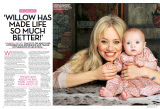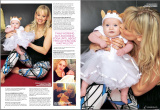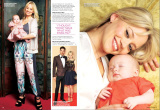Fiona Mitchell's Blog, page 8
July 28, 2016
Trying to Write Like Your Favourite Author? Just DON’T do it
I tried quite hard to be Evie Wyld for a while. Instead of becoming a contender for the Betty Trask Award, what I ended up with was the sleepy novel equivalent of downing half a bottle of whisky with your Nytol. In a word, it was crap.
The husband falling asleep with an early draft of it on top of his face, and a successful novelist friend of mine saying, ‘The thing is, I really preferred your other book,’ failed to convince me that something was wrong. I carried on buffeting my female protagonist with dramatic gale-force winds and filling my hero’s mouth with histrionic piffle.
But finally I realised why, when I spoke about that book, all my friends tried to change the subject, and I went back to book one – the one set in motion by reading a Maggie O’Farrell book. The one that had ground to a halt because it wasn’t quite Maggie O’Farrell enough.
I ripped the whole thing up and started again and this time my head didn’t scream. ‘For God’s sake, it’s a lesser Anita Shreve.’ The words, ‘You’re not good enough to be the next Kate Atkinson’ didn’t repeat like a CD with a scratch down its centre. No, I just wrote.
Somewhere along the line, I’d shaken off the need to try and be a writer other than myself, and I ended up writing my heart across 330 pages. I think I might just have found my own writing style now. It can take years to find it, but let’s be honest, even when you do find it, it’s a slippery thing. Sometimes it turns up to do the hours; other times it slides through your fingers.
My short story collection this year is a case in point. It’s been a neglected thing – what with trying to find an agent and all – but I did complete two shorts. One didn’t work out – I loved the concept and the twist, but the voice was too weak, too damn depressing. And my other story did work out, I guess. Sea Gift is a contender in this year’s Bristol Prize.
But the point is, writing without constraint, without thinking ‘I need to be as good as ……..[insert name of favourite author here], well, it’s full of possibilities and sometimes gleans grand results.
So as I stare at the blank page again – I’m about to start writing another book – I’m going to remind myself of this and take another gamble.


June 21, 2016
From Rejection to Representation – 6 Steps to Landing a Literary Agent
If you’re looking for representation, or smarting from yet another rejection letter, please don’t switch off. I’ve had some major disappointments since my first rejection letter in January 2013, but somehow I just kept writing.
I’ve kept most of my rejections in a folder called Novel. (It should really be called Novels, since I’ve written three of the things.) There have been highs – being shortlisted for the Bristol Short Story Prize in 2014, for example, when writers and publishing bods including organiser Joe Melia said some lovely things about my work. (I tucked these away for dark days.) And there have been lows. At one point, five agents were reading a full manuscript, but all of them turned me down.
When I look back though, the extreme lows, the moments that hit me hardest were the turning points – not that I knew that then. My ego was battered purple, and just a tiny frazzle of hope remained – but I kept going and at the moment, I am so thankful that I did.
Here are my six wobbly steps to getting representation (I fell over several times):
Step 1: Write the Damn Book
I didn’t do a creative writing course; I got five books out of the library about how to write a novel, and started reading them. A shame then that I didn’t take enough notice of them. I scribbled down a theme and two flagpole events then started typing. I wrote 1,000 words a day. And two years later, in 2012, I had a book. It was riddled with telling instead of showing, and it had more tangents than the human circulatory system.
Step 2: Enter a Competition
I entered my novel, Out of the Cupboard, into a debut novel competition. And fist pumps and high pitched ‘yessing’ – it was longlisted. It went on to be shortlisted and read by a panel of literary agent judges including Rowan. I didn’t win, but to my amazement, Rowan wanted to meet me. A few months later in September 2013, we met up and Rowan gave me her editorial thoughts on my book. She read the book again after I’d made changes, and boom – she rejected me. I was never going to get another chance like this, never, I told myself. I buried the book on my computer and decided to write a second one.
Step 3: Write a Second Book
Clearly upmarket women’s commercial fiction wasn’t my genre, I thought. Inspired by Evie Wyld’s All the Birds, Singing, I began writing a dark and moody literary love story. Meanwhile I was shortlisted in the 2014 Bristol Short Story Prize with a panel of judges, including Rowan. My story was entered anonymously and although it didn’t win, it was published in the anthology. I went down to the prize ceremony in Bristol where I pitched my second novel to Rowan who said she’d love to take a look.
However I then decided that this book didn’t make the grade. I excavated book one and started working on it all over again. Things began to look up when another agent requested the full, using words like ‘brilliant’ and ‘wonderful.’ Then two other agents requested the full. This is it, I thought. Trouble was all of them turned it down. One added that, for her, it was too bleak and one of the characters was too wet. Goddamn it, I’d failed again. Even my eternally optimistic husband was lost for words. However, this was a turning point.
Step 4: Write a Third Book
There was nowhere else to go with this book. I spent three days thinking about how unfair life was. And then, you know how it goes, an idea dripped in, followed by another and another. I got out a blank sheet of A3 paper and started plotting. There were columns and thought bubbles, and notes in the margin. I met up with my journalist friend, Lucy, for lunch, pulled out my A3 sheet and subjected her to the equivalent of a PowerPoint presentation while she chomped on her quinoa. She dabbed her mouth with a serviette and when she pulled it away, she was smiling. ‘I like it,’ she said.
I wrote The Maid’s Room, in a matter of months. To my delight, I was shortlisted again in the 2015 Bristol Short Story Prize and several literary agents contacted me through Twitter to request a look at my third book. One in particular seemed extremely interested in it. I contacted Rowan once again and was really surprised when she asked to see the full manuscript. There were five agents now reading it. One by one the rejections arrived. They all said much the same thing. They enjoyed my book, but the narrative wasn’t quite taut enough, the pacing wasn’t right. I was lost, and low, the lowest I’d ever been about my writing. (This was another turning point.)
Step 5: Find a Fantastic Editor
I was sitting on the floor with my back against the radiator writing a freelance health piece when I decided to open one of the rejection letters and read it again. There’s nothing like torturing yourself, right? In it, the agent said she could recommend an editor to me. I’d had my first and second book edited though and it still hadn’t got me an agent. Oh, what the hell?! I replied, saying that yes, I’d love a recommendation. And that’s when I met Sara Sarre. She read my book in two days, and said that she thought it was really strong then cut to the chase – I’d only started the story halfway through the book and two of my main characters had no arc. I wrote, and rewrote while Sara mentored me – going well beyond the call of duty. Sara read my book three times in all, and finally said the magic words. ‘You’ve nailed it and I think it’s brilliant.’
Step 6: Submit Only when the Book is Ready
I sent the full book to Rowan and initial submissions to three other agents. Two of them requested a full. Ten days later, an email from Rowan arrived. I read the last line first, but there was no brush off. Rowan wanted to meet me and talk about representation. My hands were shaking, and I said, ‘Oh my God!’ quite a lot. It was a blurry-headed moment. A few days later in a cafe close to the Furniss Lawton offices in central London, I met up with Rowan. She gave me some more editorial suggestions for my book then talked about her high hopes for it.
I’m realistic; I know this is just the beginning, but all those late nights and early mornings, all that rejection, well, it was worth it. Because finally I’ve found an agent who believes in me and my work. So please keep writing – because those dreadful down days really can lead to something good.


May 28, 2016
Should You Write the Synopsis BEFORE You Write the Book?
My story’s come from sticking two ideas together – one, taken from a newspaper cutting, the other, something that a friend is going through. The subjects fascinate me and have the potential to keep me gripped for the year it’s going to take to write the book.
A year?! Who am I kidding, right? My first novel, The Maid’s Room, has taken me five years to finish – (it was abandoned on the laptop for a lot of that time, mind you). Three weeks ago, I started submitting it again. (Fingers, toes and other relevant parts of anatomy are well and truly crossed.)
One of the reasons my first novel took so long to write is that I was a greenhorn – I had no idea what my writing style was. And when a helpful literary agent met up with me and said, ‘You need to show not tell,’ I replied, ‘Oh, of course!’ a disguise of a smile wiped across my face; I hadn’t the foggiest what she was talking about.
I’m no expert now, but I do know more.
And one mistake I’m not going to repeat is leaving the synopsis to the end. I’ve already written it for my second novel. I know I’ll veer off it, that I’ll change my mind about things. But setting the story within the framework of a synopsis is a reassurance that this new book might just work.
It contains the following three features that are essential for any book:
1 The story starts in the right place.
Put your characters in an inciting incident in your opening scenes. That way, you’ll reduce the chances of a literary agent telling you, ‘I didn’t fall into your narrative.’ Writer: Take hold of the agent’s ear and drag her over the story’s precipice.
2 Characters have arcs.
By the end of your novel, your main characters should have gone through a change. They should be different at the end to the way they were at the beginning.
3 Characters are at risk.
How are your characters in jeopardy? Show how great the risks are. Don’t let the tension and drive go slack.


May 16, 2016
Why do we keep writing?
These are questions often asked with a roll of eyes and a deranged laugh. Sometimes they’re a response to disappointment or routes blocked. And God knows, there are many of them when it comes to writing.
So just why are we doing this when there are other more worthwhile tasks or pastimes we could be undertaking? Like making a start on the dandelions colonising our lawns….
Gardening works for my mum – her back garden is awash with colour and shape, and in darker times when she hasn’t been able to get outside, it’s a thing of beauty that reaches through the glass and whispers, ‘This is something good.’ Pink roses thread their way over an archway in the corner. There’s an old butler sink cramped with purple hyacinths. Only friends and family get to see it, an occasional neighbour sticking their nose over the fence. It’s never been sent out into the world by way of competition or through Facebook snaps. My mum doesn’t need to show off her garden to enjoy it, she just does.
But that’s not the way I feel about writing. I write to be read. Yes, there’s a part of me that’s pleased when I’ve written a heart-tugging line or a sentence with some kind of rhythm. But really, I’m writing so that someone else can read my work, feel my words. I’m not talking compliments, I’m talking connection. Like a lock of eyes or a certain conversation. The way my mum once reached her hand out and touched the arm of a crying stranger in a hospital elevator. They looked at each other, the woman and my mum. No one spoke, but for a few brief seconds there was no one there but them.
If a friend or a stranger, reads one of my stories or longer works and says, ‘God, but that was good.’ or ‘That character’s really stayed with me,’ I’ve done what I set out to do.
Of course, as in life, we can’t always connect. Words can miss their mark. The reader and writer might clear their throats and cough some withering laughter into the rolling tumbleweed. There might be an honest, ‘I didn’t really get it,’ but more likely no one will mention it at all. And that’s just fine.
When readers feel that place you drew with your words though – the orange that the prisoner refused to eat because it gave such colour to the blank cell; the way the grandmother with brittle bones picked up her granddaughter and swung her around and around; the moment when a stranger laid a hand on someone in deep grief – well, that’s why I keep on with this tangle of upset and joy we call writing.


May 2, 2016
What’s the Best Book You’ve Ever Read?
How can you choose your number one when every book gives you such different things? It might be a beautifully drawn character, a killer twist, or a pace that turns you into a bionic reader. Picking your dream book is a task that demands you dig deep.
On Saturday, I asked my sunny New Yorker friend Gerry to do just that.
She fanned her fingers through the air, and widened her sparkly blue shadowed eyes. She was about to impart something important.
‘It has to be If Nobody Speaks of Remarkable Things by Jon McGregor,’ she said.
This was a recommendation I couldn’t forget. I typed the title into my iPhone and the next day, hunted the book down.
I Tweeted my little find a few hours ago and was met by a swathe of appreciation for it. It’s going to be a good’un, I reckon.
By asking the question – what’s your best book ever? – you’re bound to end up with great recommendations.
Here’s mine: The Red Tent by Anita Diamant. It’s an epic story about the biblical character Dinah and is laced with betrayal, infertility, love. I’m not a massive fan of historical fiction, so I wouldn’t have gone for it ordinarily, but a friend gave me my first copy, telling me I just had to read it. It delivers on every count – the writing is enchanting, the landscape vivid and the characters richly drawn. I’ve read it three times and don’t rule out reading it another three. I’ve bought it God knows how many times for loads of friends – because frankly it’s the perfect gift for a friend.
Have you got a number one book? If so, I’d love to add your picks to my list of unbeige books to be read.


April 25, 2016
15 Surefire Ways to Beat Writer’s Block
You know those days – the ones when you’ve set aside a stretch of time to write, but the words won’t come. You type The, then press the delete button and start riffling through your cupboard for a biscuit to dunk in your tea. The muse isn’t striking and no amount of Googling your own name or scrolling through Twitter is going to urge it in your direction.
Sweep away the crumbs from your keyboard and stop listening to that deranged voice inside your head saying I JUST CAN’T DO THIS ANYMORE!!!! because here’s how to reboot your creative streak.
1 Write Crap
Everything’s a bit rubbish to start with isn’t it? It’s the editing that polishes it up and turns it into a thing of beauty. Even if you’ve spent three hours on something that reads like a legal contract, hunker down because magic could be about to fly your way. Take it from Maya Angelou. ‘What I try to do is write. I may write for two weeks “the cat sat on the mat, that is that, not a rat.” And it might be just the most boring and awful stuff. But I try. When I’m writing, I write. And then it’s as if the muse is convinced that I’m serious and says, “Okay. Okay. I’ll come.”’
2 Stop Worrying
Okay, so it’s awful, but chill, no one apart from you is ever going to see this first attempt. ‘All writing problems are psychological problems,’ says novelist Erica Jong. ‘Blocks usually stem from the fear of being judged. If you imagine the world listening, you’ll never write a line.’ So write your first draft as if no one will ever see it.
3 Start in the Middle
Don’t fret over an opening paragraph, start in the middle instead. Write any scene or moment that comes to you. Keep doing that and the beginning and end will arrive. The same goes with plans. Start typing down ideas and plot lines will start sewing together on that previously-blank page.
4 Put Pen to Paper
So the bright, white Word document looks deadlier than a black hole? So get your old notebook out, or even better, a new one. ‘Writing on a computer can be terribly distracting,’ says Zadie Smith. ‘So sometimes I like to use a pencil and paper to jot down ideas.’
5 Create a Space
Nope, it’s still not happening for you. So step away from the screen. ‘Take a walk, take a bath, go to sleep, make a pie, draw, listen to music, meditate, exercise,’ says Hilary Mantel. ‘Whatever you do, don’t just stick there scowling at the problem. But don’t make telephone calls or go to a party; if you do, other people’s words will pour in where your lost words should be. Open a gap for them, create a space. Be patient.’ Go refresh that cold cup of tea and dunk another biscuit.
6 Be Inspired by Photographs
Take a look at Pinterest and Unsplash for beautiful imagery that might just spark off an idea. Try creating a mood board for your story or novel on Pinterest. Then write a small descriptive piece about one of the photographs as a way into your story.
7 Go on a Journey
That’s what travel writer and novelist Paul Theroux did when he ran out of ideas for novels. ‘I recommend to people, if you’re out of ideas, go away. Go somewhere. Go look for a story.’ Walk, get on a train, go for a bike ride.
8 Get some Cafe Culture
Get away from your desk, and take up residence in your local cafe. Novelist Elizabeth Day loves going to cafes to write fiction. ‘I find it really helpful to be surrounded by the buzz of other people,’ she told Mslexia.
9 Watch a Documentary
If you’re trudge to the high street hasn’t inspired you, switch on the television and watch something factual. Even if you don’t find a subject you want to write about, you might spot something in the margins of that programme – a person, a feeling, something unexplored.
10 Work on an Ideas File
Read news and features. If a story resonates with you, rip it out and push it into an ideas file. Note down interesting situations or conversations and pop them in there too. Then whenever you’re floundering, you’ll have ideas on tap.
11 Match Ideas
So you want to write about a Chilean fire brigade, but can’t think of where to go with it. Get reading and searching for a second idea and combine the two. That’s what writer Tania Hershman does. ‘What I actively do now is collide two ideas together, very often a scientific one with something else I have been thinking about, and see what results,’ she says.
‘I have been known to read two things at the same time—say, a New Scientist article and an article on something entirely different in another magazine—just to mess with my head and produce something new. Messing with my own head is an intrinsic part of my process!’
12 Read an Excerpt from your Favourite Book
Open a beloved book on a random page and read. Read the opening chapters of a handful of other books too. I keep seven favourite books beside my computer, so I can dip in when I’m stuck.
13 Do Fake Research
For inspiration, Evie Wyld reads up on something that interests her like ghosts. ‘I love real life ghost stories,’ she told Mslexia. ‘I suppose I am trying to understand something primal, what makes us afraid, fall in love, unkind; what makes us human.’
14 Read obituaries
A history of someone’s incredible life? Let it absorb you. Sadly, there’s been all too many of those this year. 2016 has not been kind…..
15 Google
(But not your own name. OBVI) If you have a vague idea turn it into an informed one by reading as much as you can about the subject. Immerse yourself in it then give writing another go.


April 20, 2016
Features
OK! Diet & Fitness


OK! Mum & Baby



eBay

Read the rest of this article on eBay.
25 Beautiful Homes



Spirit & Destiny




Journalism
OK! Diet & Fitness


OK! Mum & Baby



eBay

Read the rest of this article on eBay
25 Beautiful Homes



Spirit & Destiny




April 13, 2016
Writing a novel: False Starts and Second Chances
Positive, I mean…..
My little old book is almost ready to be frisbeed out into the world of literary agents again.
So when you’re submitting, what sort of mental attitude should you have?
I’m writing a feature on the forthcoming Rio Olympics at the moment, and researching past and possible medallists. I could take the Usain Bolt stance. I’m going to win, no doubt. Or I could be more of an Adam Peaty. ‘It’s not yours until it’s physically around your neck.’ (Hmm, that probably works better with medals than books, although……..)

Away from the sporting arena, I could go Victor Meldrew. Yesterday, a photographer pal of mine told me: ‘This may sound a bit negative, but I think you should expect the worst.’
Say, what?!
(Note to reader – he hasn’t read the book). ‘Erm, I just mean you should think negatively and then you won’t expect anything.’
Maybe I should adopt this approach.
But just now an email popped into my inbox.
‘I’ve finished reading your book and I have to say it’s looking absolutely brilliant.’ That’s my editor.
So, I’m about to walk up to the starting blocks yet again. Prayer position, and breathe….. and back to that feature…..
(Header image unsplash.com patricktomasso.com)


April 9, 2016
The Frome Festival Short Story Competition
Entry fee: £5
Prizes for 2016 are 1st prize – £300, 2nd prize – £150, 3rd prize – £75.
Enter your unpublished stories of between 1,000 and 2,200 words – either by post or online.
The three winning winning stories will be published on the website. This year’s judge is literary agent Jane Judd.
Entries should be typed on single sides of A4, 1.5 or double spaced, with pages numbered.
A separate sheet should be attached with your name, address, phone number and email address, plus story title and word count.
Stories should show title and word count only. Your name should not appear in the main body of your story.
For more information, click here.
Enter here.
Last year, I was lucky enough to win this competition with my story Plenty More Where You Came From.
For tips on how to win a short story competition, take a look at this.





